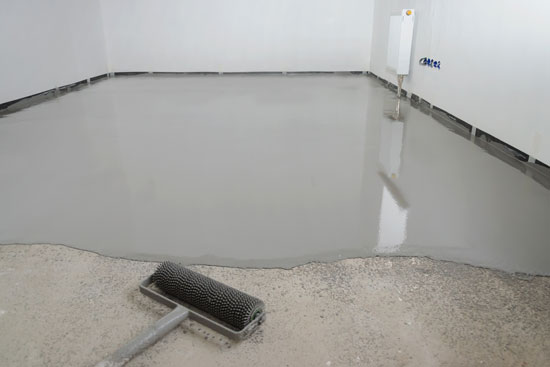
Mortar stabilizer is a kind of high-molecular polymer suitable for high-fluidity cement-based building materials. When the materials are mixed with water for construction, the bleeding and segregation of mortar system can be effectively reduced.
The conventional stabilizer for self-leveling mortar is cellulose ether with low viscosity. The stabilizer described below is a synthetic polymer, STARVIS®3003F or STARVIS® 4302F, developed by BASF, Germany. Due to its special performance, the stabilizer made from STARVIS end 3003 f + MELFLUX ® 2651 f (poly carboxylic acid ethers- water reducer) has achieved better performance in leveling mortar than casein + low viscosity cellulose ethers of self-leveling mortar, or other type of high efficiency water reducing agent + low viscosity cellulose ethers.
The mechanism of its function is-
- Polycarboxylic ether water reducer molecules can disperse the condensed cement particles, reduce the adhesion and friction between cement particles and fillers, and promote the fluidity of cement paste.
- While STARVIS 3003F mortar stabilizer is added to the self-leveling material, the stabilizer dissolves in water, viscosity gets increased, hinders the deposition of cement particles and fillers, and prevents the mortar from leaking water, but the slurry still has a good liquidity.
The mixing time of self-leveling mortar of different systems is different. Generally, samples are mixed in 15s to test the fluidity, but the formula of casein system is about 3 times longer than that compound of Melflux® 2651F and Starvis® 3003F. The short mixing time is more suitable for the mechanical construction of self-leveling mortar and can improve the construction efficiency.
MelfIux® 2651F (0.25 % of the total amount of mortar) system has a higher fluidity retention rate than casein system. Self-leveling self-healing test was carried out by knife cutting, and the surface state of self-leveling mortar hardening was evaluated by 7-step evaluation grade. Experiments show that compound of Melflux® 2651 F +Starvis® 3003 F/Starvis® 4302 F self-leveling mortar systems have better long-term self-healing properties.
The initial and final setting time of self-leveling mortar systems composed of different formulations are quite different. For self-leveling mortar, there needs to be enough time to ensure the application of self-leveling mortar, and the mortar can set and harden quickly after the completion of construction, so as to facilitate the later process. Therefore, it is an ideal self-leveling construction material. This composite system mentioned above has this advantage.
The initial and final setting time of self-leveling mortar systems composed of different formulations are quite different. For self-leveling mortar, there needs to be enough time to ensure the application of self-leveling mortar, and the mortar can set and harden quickly after the completion of construction, so as to facilitate the later process. Therefore, it is an ideal self-leveling construction material. This composite system mentioned above has this advantage.
The compressive strength and bending strength of self-leveling mortar of different formulation systems in early stage vary greatly. Melflux®2651 F+Starvis® 3003 F or Starvis® 4302 F system has a higher early strength than that of other systems after 4hours, which achieves the hardness required by standing on feet, and reduces the installation time of the floor tiles and the construction time.
The performance indexes of mortar stabilizer mainly are:
Appearance: White or light yellow powder
Bulk density: 250-400kg per CBM
Dry loss: less than 10.0%
pH(20℃, in 20% solution): 6.0~9.0
Application characteristics of mortar stabilizer products- take STARVIS®3003F as an example:
Especially suitable for cement or gypsum based building materials with high flowability, can significantly reduce the system bleeding and segregation, less impact on the system fluidity, low dosage and applicable content range, will not delay the hydration of cement, and have good compatibility with other additives.
Suitable for non-shrinkage grouting materials/mechanical grouting materials, bottom self-leveling mortar, cement base floor, gypsum base self-leveling and repair mortar, dry mixed concrete, thin layer plastering mortar; Recommended dosage: 0.05% –0.20% (depend on mortar quality ).
